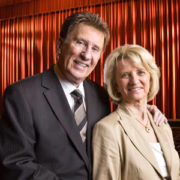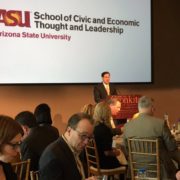As Professor Brown puts it, we are living “in the ruins of Neoliberalism.” It’s up to us to change that reality, to flip Margaret Thatcher’s oft-quoted script of “There is no alternative!” (but Neoliberalism). Achieving that outcome is the socio-political fight of our era.
Over 74 million voters cast ballots for Trump in the 2020 election—12 million more than voted for him in 2016. Trump will exit office in January, but those 74 million voters aren’t going anywhere. It’s not a monolithic group, either. Younger and older, richer and poorer, rural and suburban, and more, a diversity of Americans believe in and support positions that only those in denial would conclude, “But that’s not America!” Quite the contrary, it is becoming America. And, in some ways, it already is.
Consider these widespread beliefs and positions. Many Americans share a anti-abortion stance, have a particularistic interpretation of the First Amendment, and strongly resist attempts to strengthen gun control laws. They condemn what they believe to be misguided left-wing activism, want stronger border and immigration management, do not support the ‘Black Lives Matter’ movement, and believe the U.S. is being taken advantage of by countries around the world. Many Americans also cried “Government overreach!” when officials issued public mandates during the current pandemic (e.g., mask-wearing ordinances).
Conventional classifications—they are Conservatives, mostly Republicans, with Libertarians, right-leaning Independents, and various others joining in—isn’t adequate to fully describe what America is becoming.
She calls it Neoliberalism.
Coined as a term over 80 years ago, Neoliberalism’s genesis is the socio-politics of the 1930s, most notably with Nazism (Germany), Communism (Russia), and strong central government control in the U.S. during “The New Deal” FDR years. Concerns emerged (and not hyperbolically so) about ‘how the world might look’ if any of those systems became pre-eminent.
So, what might be a counterforce? The answer was conjoining capitalism and morality in an amalgam of money, markets, and ‘traditional’ values (e.g., freedom).
But an approach that was initially imagined as a strategy to counter excessive state control has evolved over the decades into something much more.
By the late 1970s and early 1980s, neoliberalism began influencing national public policy in Great Britain (Margaret Thatcher) and America (Ronald Reagan), among other countries. Thatcher may have been its biggest cheerleader, repeatedly saying in public and writing that “There is no alternative!”
What Neoliberalism wrought was a smaller government, deregulated financial and capital markets, antagonism toward organized labor, rejection of progressive taxation, reduction of the social safety net, the rise of the non-profit sector (responsibility shifted from the public sector), the privatization of public programs, and other related policy preferences.
As Neoliberalism evolved, it morphed. By the 1990s, Brown contends, it became a “saturating reality principle.”
Recognizing the breadth and strength of Neoliberalism’s reach, French philosopher Michel Foucault, among others, argued that Neoliberalism had “radically altered values and reality principles that govern conduct.’ Put another way, neoliberal thought and practice became ‘the way we do things.’
Strangely, though, Neoliberalism was rarely called as such. It either carried a variety of names or had no name at all. In effect, Neoliberalism became the contemporary version of Adam Smith’s ‘invisible hand.’
I witnessed its impact first-hand in the field of higher education.
All the while, public distrust of the government increased. No wonder, then, why so many Americans resonate with references to ‘The Deep State’ and ‘Drain the Swamp.’ They also decry government entitlements and oppose government funding of social programs, such as Planned Parenthood, when public programs don’t align with their values and beliefs.
Related to this way of thinking is the centrality of individual rights and the freedom to choose.
Consider what has happened during the COVID pandemic. Rather than the Federal government taking charge and exercising a firm hand nationally to manage the pandemic, the Administration kicked responsibilities to the states. But every time a governor sought to take charge ‘for the public good,’ there were cries of “Foul!”—as we saw happen in Michigan, for example.’ And, in Florida, the state’s governor not only refused to issue a statewide mask mandate, but he also rendered nil attempts by local jurisdictions to do so. But in true Neoliberal fashion, businesses could choose how to respond, including requiring patrons to wear masks, which many of them have done and still do. So while the FL state government wouldn’t take charge to protect public health, the corporate sector became a public guardian.
What’s happening? Brown attributes to Austrian-British economist Friedrich Hayek (one of Neoliberalism’s primary architects) the belief that public leadership for the public good can become “a freedom-destroying monster of an invasive state.”
Here’s a recent example of that thinking in action. University-sanctioned gambling on college sports has been long considered an activity apart from higher education and something that higher education should not endorse. But, recently, a major public university created an alliance with a sports betting firm that will benefit the school financially in various ways and for a number of years. Rather than criticize the move, Neoliberalists accept it. Consider how a frequently-cited national authority on collegiate sports put it in a press interview: “In terms of gambling, it generates so many millions of dollars. I don’t think it’s out of line for a school to partner with a respected gambling entity. Would I prefer that it didn’t happen? Sure, but you have to be realistic.”
To Brown, this is a classic example of how markets get moralized, and morals get marketized.
But there’s another storyline in Neoliberalism that, at first blush, seems at odds with what I’ve just written. While certain values and ways of thinking evolve, other values are pre-ordained to remain the same. Here’s an example. Recently, I was harassed by phone and had my phone number released on social media in response to my publicizing a public gathering associated with the Women’s March movement. Comments came largely from women who were highly critical of other women engaging in what they termed a ‘socialist activity’ and viewed as an ‘anti-Trump rally.’ Prominent among the criticisms were references to women’s traditional roles, Jesus, and how activists were ‘baby killers.’
My experience is an example of how some Americans want traditional ways, such as gender norms and Judeo-Christian beliefs, “to be left untouched” (per Brown), and how important it is for them to “protect the traditional moral order against incursions.”
From the time of Falwell’s ‘Moral Majority’ to current discussions in the hierarchy of America’s Catholic Church about barring President-elect Biden from receiving Communion, a segment of America protests when public actions run contrary to their religious beliefs. They believe that the moral order (as they interpret and embrace it) is ascendant. Consequently, they use various means and methods to keep the traditional world “from being washed away.”
Along the way, science, together with other forms of judicious meaning-making and conclusion-drawing, holds a curious and surprising status–sometimes endorsed and, at other times, open to skepticism, criticism, and (sometimes) subversion.
If that’s not enough, consider how democracy can be interpreted. Rather than being universally viewed in America as a system to be defended, tended, and protected at all costs, it’s also open to manipulation and subversion when democracy ‘gets in the way’ of achieving valued ends. Gerrymandering and vote/voter suppression are two examples. As Brown avers, “the more democracy is loosened from standards of truthfulness, reasonableness, accountability, and problem-solving through comprehending/negotiating differences, the more discredited it becomes.” But so what? Brown contends that the Neoliberal dream isn’t ‘democracy.’ iI’s “replacing democratically governed society with one that’s organized around markets and traditional morality, under the sign of freedom.”
Those three reference points—markets, traditional morality, and freedom—well-describe the understanding to which I have come, and it’s a deadly combination, too. It puts America’s 250-year old project in jeopardy.
The reason lives next door. Brown’s ‘curious combination’ of perspectives/viewpoints has become the preferred political discourse of millions of Americans. And what makes the assembly especially formidable is that it includes strange bedfellows, including wealthy suburbanites, impoverished rural Americans, Evangelicals, White Supremacists, Second Amendment freaks, pro-life zealots, and more. They all find a spot under the Neoliberal tent.
And what makes the situation even more problematic is what often happens in paradigms. To protect the core and keep the paradigm alive, elements will be borrowed from an alternative paradigm and integrated into the dominant offering.
As Neoliberalism morphed over the decades, a hybrid version emerged. Progressive Neoliberalism, an amalgam of Progressivism and Neoliberalism, looks one way or another depending on the frame of reference.
What’s at stake? It’s America. With stealth-like behavior, Neoliberalism has changed America. Today, America is a shadow of what it was meant to be, what it had been, and what it could be. That’s because Neoliberalism privileges the individual over the commonwealth, and it puts democracy at risk. Neoliberalism also amplifies intolerance, dismissiveness, and exclusivity. And it’s not a matter of whether America will come to all of that. It already is that.
What’s needed? First, we need to call out Neoliberalism and describe its corrosive effect on American ideals. Second, activists need to be more vigilant, energized, and forceful than ever. Third, more Progressives need to occupy the halls of government and hold authority positions across sectors.
All of that is more easily said than done. Here’s why.
My public experience with speaking out against Neoliberalism is dominated by seeing puzzled faces and people asking basic questions: “What are you talking about?” “Neoliberalism?” Having an impact often requires taking a targeting strategy, namely, referring to a familiar and personally frustrating circumstance (e.g., people refusing to wear masks because ‘it’s their right not to”). Global references about the ills of Neoliberalism seldom work.
And while activists are engaged extensively across America, the reality is that the challenges they face are great while the numbers involved are small. A recent study conducted by the international group, More in Common, found that only about 8% of the American electorate can be classified as Progressive Activists, highly engaged and focused on change. But a like-sized group of Americans (6%) comprise a group called Devoted Conservatives, that is, people who are also highly engaged, but largely to defend and protect what they believe in and value.
That means progress toward attacking Neoliberalism requires getting more ‘inclined’ Americans involved.
The last piece of advice—for more Progressives to serve in key roles, public, private, non-profit, and civic—is the tallest order of all. That’s because Neoliberally-inclined people dominate the leadership landscape.
It is not hyperbolic for me to say that one of the most stunning experiences of my adult life has been to witness the widespread transition to Neoliberalism in public, non-profit, and civic affairs.
The bottom line is clear. As Professor Brown puts it, we are living “in the ruins of Neoliberalism.” It’s up to us to change that reality, to flip Margaret Thatcher’s script of “There is no alternative! (but Neoliberalism)” But without a doubt, getting there is the fight of our era.



